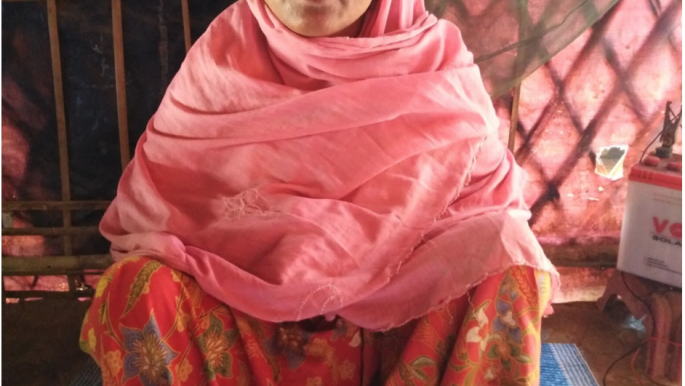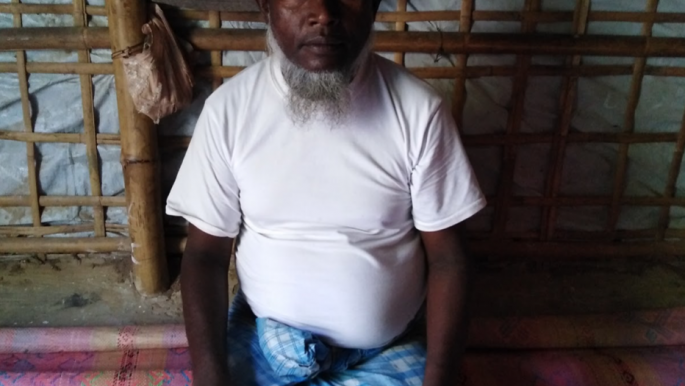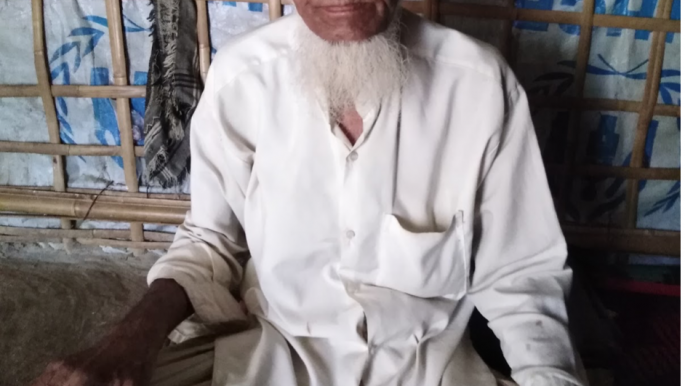After starvation and violence, traumatised Rohingya fear impact of cyclone on prison island
The New Arab spoke with parents of youngsters desperate to be reunited with their families as they brace themselves for the impact of Cyclone Amphan. Experts predict it's likely to hit low lying coastal areas like Bhasan Char, which sits at just three metres above sea level.
The trauma of starvation, rape and violence are added not just to fears of a brewing storm, but to the impact of coronavirus for a young generation of Rohingya on the island who have already survived the treachery of traffickers holding their families to ransom.
Bangladesh authorities rescued almost 700 Rohingya from traffickers over the last few weeks. It is understood boats carrying others may still be out at sea in the Bay of Bengal and the Andaman Sea.
In a statement to The New Arab, the UNHCR confirmed 400 of these were sent to Cox's Bazaar where they were quarantined before returning "safely to their families". The remaining 300 Rohingya - "likely to be vulnerable, traumatised and have urgent protection needs" - were shipped to Bhasan Char.
 |
The trauma of starvation, rape and violence are added not just to fears of a brewing storm, but to the impact of coronavirus for a young generation of Rohingya on the island |  |
Many of the boat people had plans to either reunite with marital partners in Malaysia - or get jobs to support families left behind at the Kutupalong refugee camp in Cox's Bazaar.
Aman Ullah, 75, told The New Arab his daughter, Shaam Shida, aged 22, nearly drowned during her ordeal with traffickers when she fell into the sea after fainting from starvation and thirst.
 |
|
| Noor Begum: "I have cried so much I have ran out of tears" [TNA Ro Mohammad Faruque] |
Shaam was one of at least 50 boat people told to embark a small vessel after her family paid a ransom so she could return to camp. But she and 28 others were caught by authorities and sent to Bhasan Char.
Mr Ullah added: "She was crying because Bhasan Char is not safe and she wants to come home. She said they are being fed there but they have no clothes to wear."
After failing to transport Shaam to Malaysia, Mr Ullah said traffickers bailed on their promise to refund the 42,000 BD Taka (£406) he borrowed to get his daughter to Malaysia where she hoped to be reunited with her husband.
He said: "As a married girl, it's difficult for her to live without her husband. I really want them to see each other and I cannot be in peace until they are together."
Mr Ullah is in debt, worried about the wellbeing of his daughter and afraid to confront traffickers. "They scold me, but I am an old man, so I can't do anything about it."
This is a running theme and a common story amongst families of those stranded on Bhasan Char right now. Noor Islam, 59, also paid a similar amount to send his 18-year-old son Mohammad Sayeed to Malaysia.
Emaciated, malnourished and traumatised, Mohammad was one of the 300 Rohingya who arrived at Bhasan Char with hopes and dreams in tatters.
Mr Islam told The New Arab: "We are panicked about the island because we hear families of boat survivors might be taken there too. We request the Bangladesh government to shoot us before doing this. It is dangerous to be there.
According to eyewitness accounts, women and girls comprised 70 percent of passengers on the vessels and were subjected to rape and sexual violence.
 |
According to eyewitness accounts, women and girls comprised 70 percent of passengers on the vessels and were subjected to rape and sexual violence |  |
Mr Islam added: "My son tells me they were treated worse than animals. Girls were raped brutally by the cruel boatman. Children, the elderly and young people were beaten when they asked for food and water. But still, they are alive because of Allah's mercy and help."
Ro Mohammad Faruque, a Rohingya aid worker and The New Arab's stringer on the ground, said many Rohingya opt to send their daughters into dangerous situations like this because they are bound by the traditions of a dowry system which they are too impoverished to observe.
 |
|
| Abul Hashim: "All our expectations are ruined" [TNA/ Ro Mohammad Faruque] |
He said it was "cheaper" to send their daughters with traffickers to Malaysia - where it is hoped they can earn a living - than to meet demands of dowries made by families of potential bride grooms in the camp.
"In our culture, marriage is everything and the moment a girl is born, her parents will start to think of how they will pay the dowry."
The 25-year-old is one of many voices from a young generation of Rohingya to speak out against the conservative system. "Poor people cannot afford dowries so they feel they have no choice but to send daughters onto the boats.
"But we need to save these girls and their dignity by stopping this dowry system because it is creating much trauma and anger for the girls."
Anzul Husson's daughter who is currently at Bhasan Char, is an example of such a case. Mr Husson told The New Arab that 19-year-old Musharafa had discussed the option to take the boat, and with her parents, then made the decision to board because they could not afford her dowry.
He added: "She is at the marriage age and we felt helpless with our poverty that we could not pay her heavy dowry. We know it's not safe on the boat but we felt really helpless."
Mr Husson said traffickers "lied" about the whereabouts of his daughter for several weeks after she had embarked until they began to threaten him with extortion as well.
 |
I have cried so much I have ran out of tears. My son said the conditions on the boat were terrible |  |
Noor Begum said she lost her husband a year after the birth of their son Abdul Motlab, now 18. The 42-year-old told The New Arab: "They said I will not see my son again if I do not pay 55,000 BD Taka (£533)."
Ms Begum said she managed to reduce the ransom to 40,000 BD Taka (£384), but this meant selling the gold jewellery received on her wedding day. But this money, she said, was stolen by a rickshaw driver and his friends, which meant she had to borrow again from relatives who had already loaned funds to send Abdul with the traffickers in the first place.
 |
|
| Aman Ullah: "They scold me, but I am an old man, so I can't do anything about it" [TNA/ Ro Mohammad Faruque] |
"I have cried so much I have ran out of tears," she said. "My son said the conditions on the boat were terrible. They were given a handful of rice every three days and beaten if they asked for more."
About Bhasan Char she added: "My son tells me it is not safe. Even animals would be afraid to go there. I heard people never survived because it can be flooded at any time with storm and cyclone."
At the age of 17, Abdul Hamid is one of the youngest Rohingya on the island. His father, Abul Hashim, 53 said: "All our expectations are ruined. We are grateful to the navy for saving our son, but he must return from this hazardous island, which we hear can be flooded at any time because it is in the middle of the sea."
According to Louise Donavon, a UNHCR spokeswoman, the Bangladesh Meteorological Department has 10 cyclone warning levels and has ranked the current danger at level six.
Ms Donovan said the Bangladesh Government's Cyclone Preparedness Program has disseminated the cyclone warning to all 34 Rohingya refugee camps in Cox's Bazaar. She said refugees are being informed about "what measures to take to protect themselves, and what to do in the case of an emergency situation.
"Refugees are at the centre of the emergency response, with more than 3,000 trained volunteers in both the refugee and host communities, who will act as first responders."
About Rohingya on the island, she added: "We are seeking additional information from the Government. We do not have an operational presence on the island.
As Bangladesh, an impoverished nation, struggles with the pressures of hosting the world's biggest refugee camp and prepares for a cyclone during a global pandemic - aid agencies have urged richer nations to step up their efforts.
Refugees International president Eric Schwartz told The New Arab: "All governments, including the government of Bangladesh, must provide safe refuge for those fleeing persecution.
"But donor governments like the United States must do much more to help the government of Bangladesh. They can express their solidarity with Bangladesh by fully funding the international humanitarian appeal for the Rohingya."





 Follow the Middle East's top stories in English at The New Arab on Google News
Follow the Middle East's top stories in English at The New Arab on Google News


